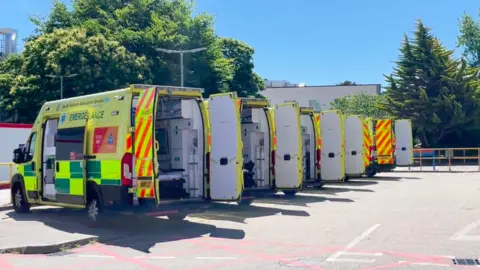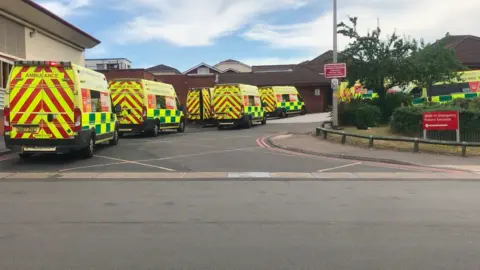Ambulance services on fringe of collapse - paramedic
 BBC
BBCAmbulance services are under intense pressure, with record numbers of callouts and the most urgent, category-one, calls last month.
BBC Two's Newsnight programme spent from 08:00 to 20:00 on Monday at six hospitals with the longest delays handing patients over from paramedics to accident and emergency staff.
This should take 15 minutes or less - but crews often wait many hours and sometimes whole 12-hour shifts, with ambulances queuing outside unable to respond to other emergency calls.
- At Royal Cornwall, 25 ambulances were queuing by the afternoon, three for at least 10-and-a-half hours
- At Worcestershire Royal, 15 were queuing up to four hours, before the Newsnight researcher was ordered off the premises
- At Derriford, in Plymouth, 20 were queuing up to 11 hours in an overflow car park
- There were three-hour queues, at Bristol Royal and Royal Shrewsbury, more than five hours at Heartlands, in Birmingham

"We're right on the fringe of collapse right now," a paramedic who has worked in emergency care for more than a decade said.
"People are phoning and being told that they're not going to get an ambulance for six or nine hours.
"And that's happening routinely - that is happening pretty much every shift.
"I've had nurses say to me, senior sisters, 'If we let you go, you'll just bring us more.'"
'Too late'
The delays are clearly a huge cause of stress for those in an already extremely challenging job.
"It would be wrong to say that there are times when I haven't shed a tear... for the people we haven't been able to help because it's been too late," the paramedic said.
"They may have died anyway but there are definitely cases that I've been to where we should have been to them sooner and less harm would have come to them."
Newsnight asked every ambulance trust for an interview - none said yes.
But the minutes and papers from their directors' meetings reveal the scale of the crisis, in stark language.
South West ambulances:
- wait 10,000 hours a week outside hospitals, prompting the trust to seek help from the military
- it "turned off the [999-call handlers'] script, which gave people an average wait for a resource" for less serious calls
- handover delays are "the one single issue… having a considerable detrimental impact on category-one and category-two times, with long responses to patients", executives say
- this is "not an acceptable situation" and "soul destroying" for the ambulance crews
In the West Midlands:
- "several patients waited over 19 hours to be handed over"
- "patient-handover delays continue to result in significant patient harm and the impact of these delays resulting in long patient-waiting times also causes harm, including death"
- with no improvement, the trust's nursing director says, "by 17 August, it may become impossible to respond to patients at all"
Hospitals clearly need to do more to speed up transfers.
But doctors' representatives deny they are obstructive or unreasonable.
The whole system was "broken", Royal College of Emergency Medicine president-elect Dr Adrian Boyle said, with hospitals unable to discharge thousands of well patients into social care.
"We can't just open up into a corridor in an emergency department where there isn't space," he told Newsnight.
"The corridors in emergencies are frequently full anyway.
"What's better is if we can discharge patients from hospital, create that space so we unblock our emergency departments and allow ambulances to hand over their patients seamlessly."
'Working together'
When Jamie Rees, 18, collapsed with a cardiac arrest in the early hours of New Year's Day, an ambulance did not reach him for 17.5 minutes.
Ambulance trusts should respond to category one cases like Jamie's within an average of seven minutes.
But by the time the ambulance reached Jamie, his brain had been starved of oxygen for too long. He never regained consciousness.

"We were told that there were 32 ambulances available after midnight on New Year's Day," his mother, Naomi Rees-Issitt, said.
"And sadly, 17 of those were [waiting] outside hospitals."
West Midlands Ambulance Service confirmed 17 of the 32 on duty in the area had been at or on the way to a hospital - and six had been waiting more than an hour.
"Long hospital handovers delays impact our ability to get to patients quickly," it said, "which is why all NHS partners are working together to reduce them so that patients don't wait longer for an ambulance to come to them than anyone would want."
'Severely compromised'
Association of Ambulance Chief Executives (AACE) managing director Martin Flaherty said: "The current pressures on the ambulance service are unprecedented and have been building for some time.
"The ultimate safety net for the NHS is the fact that patients who are severely ill or injured can access an emergency ambulance in a timeframe appropriate to their clinical condition.
"That safety net is now severely compromised and sadly patients are dying and coming to harm as a result on a daily basis."
The impact on patients and staff was intolerable, Mr Flaherty said.
'Address pressures'
"AACE accepts that the root cause of these problems is system issues relating to patient flow and that they will require system solutions," he said.
"That said, it is clear that these system solutions, involving both health and social care, will take years to fully implement.
"It simply cannot be acceptable to allow the ambulance service to be compromised to the current extent, day after day, while those solutions are introduced."
A Department of Health and Social Care official said: "We recognise the pressure NHS staff are under, especially those on the front line.
"The NHS has allocated £150m of additional funding to address pressures on ambulance services, with the number of ambulance and support staff increasing by almost 40% since February 2010.
"We have supported NHS bodies and local authorities with updated hospital-discharge guidance to ensure smooth discharges across the health and social care sectors and have been clear that they should adopt processes that best meet the needs of the local population."
An NHS spokesperson added that the health service was facing huge challenges, including a near record-breaking level of 999 calls, rising Covid cases and thousands of staff absences, but that "it remains vital that the public continue to dial 999 in an emergency and use 111 online, or their local pharmacy for other health issues and advice".
Newsnight's report can be watched on Friday 15 July at 22:30 BST on BBC Two, on BBC iPlayer and the programme's website.